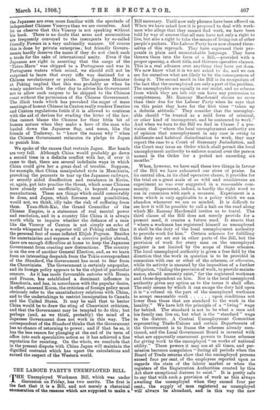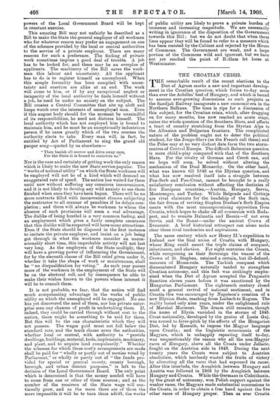THE LABOUR PARTY'S UNEMPLOYED BILL.
■ TIHE Unemployed Workmen Bill, which was under -JL discussion on Friday, has two merits. The first is the fact that it is a Bill, and not merely a rhetorical enumeration of the reasons which are supposed to make a Bill necessary. Until now only phrases have been offered us. When we have asked how it is proposed to deal with work- men who allege that they cannot find work, we have been told by way of answer that all men have not only a right to live, but also a right to take the means of living out of other people's pockets. The Labour Party have now cleared them- selves of this reproach. They have expressed their pro- posals in plain and unmistakable language. They have thrown them into the form of a Bill,—provided with a proper opening, a short title, and thirteen operative clauses. This is a real advance over anything they have yet done. We now know what it is we are asked to do, and we can see for ourselves what are likely to be the consequences of doing it. The second merit in the Bill is its recognition of the fact that the unemployed are only a part of the problem. The unemployable are equally in our midst, and no scheme from which they are loft out can have any pretension to completeness. Mr. Ramsay Macdonald claims no more than their due for the Labour Party when he says that on this point they have for the first time " taken up a definite attitude." They consider that the unemploy- able should "be treated as a mild form of criminal, or other kind of incompetent, and be sentenced to work." And when we turn to the Bill we find in Clause 7 a pro- vision that " where the local unemployment authority are of opinion that unemployment in any case is owing to deliberate and habitual disinclination to work, they may report the case to a Court of Summary Jurisdiction, and the Court may issue an Order which shall permit the local unemployment authority to enforce control over the person named in the Order for a period not exceeding six months."
When, however, we have said these two things in favour of the Bill we have exhausted our store of praise. In its central idea, in its chief operative clause, it provides for the trial on a great scale of as wild and mischievous an experiment as was ever suggested in a reasonable com- munity. Experiment, indeed, is hardly the right word to use in connexion with such a measure. Experiment is a term which is only applicable to a policy which we can abandon whenever we are so minded. It is difficult to see how it will be possible to call a halt on the road along which Mr. Ramsay Macdonald invites us to travel. The third clause of the Bill does not merely provide for a present need, it creates a future need. It enacts that " where a workman has registered himself as unemployed it shall be the duty of the local unemployment authority to provide work for him." Certain schemes for fulfilling this duty are set out in other parts of the Bill, but the provision of work for every man on the unemployed register is not limited by the scope of these schemes. The local unemployed authority is given a free field by the direction that the work in question is to be provided in connexion with one or other of the schemes, or otherwise, while its activity is ensured by the imposition of a further obligation, "failing the provision of work, to provide mainte- nance, should necessity exist," for the registered workman and those dependent on him. Nor is the local unemployed authority given any option as to the terms it shall offer. The only means by which it can escape the duty laid upon it is " a refusal on the part of the unemployed workman to accept reasonable work upon conditions not lower than those that are standard to the work in the locality." We have left the principle of a " living " wage far behind. The standard is not to be what a man and his family can live on, but what is the " standard " wage in the district. A Central Unemployment Committee representing Trade-Unions and certain Departments of the Government is to frame the schemes already men- tioned, and the Local Government Board is invested with what are apparently concurrent powers to frame schemes for giving work to the unemployed " on works of national utility." These powers it may use at all times, and per- mission becomes compulsion " during all periods when the Board of Trade returns show that the unemployed persons exceed four per cent. of the employees reported. upon as regards the state of the labour market or when the registers of the Registration Authorities created by this Act show exceptional distress to exist." It is pretty safe to say that with such a provision of work as this always awaiting the unemployed when they exceed four per cent., the supply of men registered as unemployed will always be abundant, and in this way the new powers of the Local Government Board will be kept in constant exercise.
This amazing Bill may not unfairly be described as a Bill to make the State the general employer of all workmen who for whatever reason may prefer an engagement on one of the schemes provided by the local or central authorities to the service of a private employer. There are many reasons for such a preference. The finding of private work sometimes implies a good deal of trouble. A job has to be looked for, and there may be an overplus of applicants. The machinery of the Bill saves the work- man this labour and uncertainty. All the applicant has to do is to register himself as unemployed. When this simple formality has been complied with uncer- tainty and exertion are alike at an end. The work will come to him, or if by any exceptional neglect or incapacity of the local authority he finds himself without a: job, be need be under no anxiety on the subject. The Bill creates a Central Committee that sits up aloft and keeps watch over the interests of unemployed men. Even if this august body should for the moment be unmindful of its responsibilities, he need not distress himself. The local authority which has not employed him is bound to maintain him, and he must be an exceptionally industrious person if he cares greatly which of the two courses the authority elects to take. Every man will, in fact, be entitled by Act of Parliament to sing the grand old pauper song—quoted by us elsewhere- • " Then banish all sorrow and drive away care, For the State it is bound to maintain us."
Nor is the ease and certainty of getting work the only reason which is likely to make the new State service popular. The "works of national utility " on which the State workmen will be employed will not be of a kind which will demand an exaggerated rate of speed. The nation has waited for them until now without suffering any conscious inconvenience, and it is not likely to develop any wild anxiety to see them finished when once they have been begun. There will be no More contracts filled with inconvenient clauses subjecting the contractor to all manner of penalties if he delays com- pletion ; and there will always be workmen to whom the absence of such provisions will seem a real advantage. The dislike of being hustled is a very common feeling, and an employment which gives a fairly complete assurance that this dislike will be respected will have many attractions. Even if the State should be disposed in the first instance to imitate the private employer, and insist on a job being got through in what the workmen consider an uncon- scionably short time, this improbable activity will not last very long. As the employees of the State multiply, they will have a growing power of influencing the Government, for by the eleventh clause of the Bill relief given under it, whether it take the shape of work or maintenance, shall be " no disqualification for voting." As each year passes more of the workmen in the employment of the State will be on the electoral roll, and by consequence be able to make their wishes known to the powers whose interest it will be to consult them.
It is not probable, we fear, that the nation will find Much compensating advantage in the works of public utility on which the unemployed will be engaged. No one his yet discovered the need of them, nor has private enter- prise seen any chances of profit in undertaking them. If, indeed, they could be carried through without cost to the nation, there might be something to be said for them. But this will be the one characteristic which they will not possess. The wages paid must not fall below the standard rate, and the tenth clause arms the authorities, whether local or central, with authority to " provide divellings, buildings, material, tools, implements, machinery, and plant, and to acquire land compulsorily." Whether the schemes for which these costly arrangements are made shall be paid for " wholly or partly out of monies voted by Parliaineut," or wholly or partly out of " the funds pro- vided for special or general county, county borough, borough, and urban district purposes," is left to the decision of the Local Government Board. The only point which is determined is that the money needed will have to come from one or other of these sources ; and as the number of the receivers of the State wage will con- tinually grow, and as the more there are of them the more impossible it will be to turn them adrift, the works of public utility are likely to prove a private burden of immense and increasing magnitude. We are necessarily writing in ignorance of the disposition of the Government towards this Bill ; but we do not doubt that when these lines appear they will be found to refer to a measure which has been resisted by the Cabinet and rejected by the House of Commons. The Government are weak, and a• large portion • of the Commons wild and ignorant, but we have not yet reached the point of Bedlam let loose at Westminster.











































 Previous page
Previous page